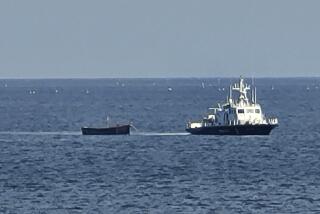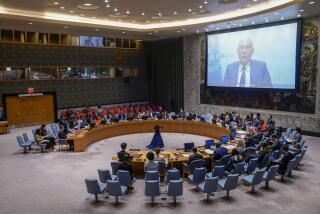N. Korea Executions Reported
SEOUL — In a new crackdown on defections and smuggling to China, the North Korean regime has conducted public executions of at least three people, possibly dozens more, say human-rights advocates here who have examined a recently obtained videotape.
The grainy footage is believed to show firing squads executing alleged human traffickers before large crowds in Hoeryong, a North Korean border town that has been a major transit point for tens of thousands of people escaping their impoverished homeland.
Many brokers work in Hoeryong helping defectors cross the Tumen River into China and arranging illegal marriages for North Korean women with Chinese men.
Broadcast this week by the Japanese television network NTV, the footage marks the first time that purported evidence of public executions has been smuggled out of North Korea. The video apparently was shot with a hidden camera and brought out by defectors. Human rights investigators in Seoul said they believed the footage was genuine.
If true, public executions would mark a change in approach by North Korean authorities, who in recent years have tried to avoid giving fresh ammunition to human rights advocates.
“For the last two or three years, the North Korean regime has been very conscious about criticism they’ve received from the international community, and any executions they conducted were done quietly indoors,” said Han Ki-hong, president of the Seoul-based Network for North Korean Democracy and Human Rights.
“I would guess by holding a public execution like this close to the border, they wanted to get some publicity to send a message to residents throughout the region.”
Han’s group believes that as many as 70 people may have been executed around the border area in recent months, but there is no documentary evidence to back the sketchy reports.
In the video aired this week, one scene shows hundreds of people, many on bicycles, gathered on a grassy riverbank near Hoeryong’s main market. From a sound truck, officials order the crowd to stand back.
Men in the crowd can be heard complaining in North Korean accents that somebody is blocking their view. In the distance, there are blurry figures that seem to be two men being tied to wooden posts.
Then, the sound of three bursts of gunfire.
Children then rush forward, apparently to see the bodies being loaded into a military truck. Nine prisoners, who received lesser sentences, can be seen being herded away with their hands tied behind their backs.
A third execution is shown that apparently was held the following day in the outskirts of Hoeryong in front of a train station decorated with a large portrait of North Korea’s founder, Kim Il Sung. Before the gunshots are heard, a judge reads the charges against the defendant, who was accused of helping defectors escape.
“These criminal acts ... are most unpardonable anti-revolutionary acts of betrayal,” the judge says, according to a partial transcript released by human rights advocates. “Today’s political situation demands that we be on the alert ... to prevent imperialist ideological and cultural infiltration.”
Many North Koreans have told of public executions in the mid-1990s in which the condemned were similarly tied to posts and shot with three bursts of gunfire.
“It is exactly the way I remember the executions in the past,” said Han Young-jin, a 35-year-old North Korean defector who works with human rights groups in Seoul, the South’s capital. He has examined the video and believes it is genuine.
“They had stopped doing these public executions. I’m sad and angry to see them coming back,” he said. “These people especially are accused of being traffickers and kidnapping, but really they were helping people like myself escape.”
A missionary who works in the Chinese border city of Tumen said the North Korean regime had recently sent new units of border guards and military from the capital, Pyongyang, to prevent defections.
“There are many fewer defections lately because people from Pyongyang are monitoring the border,” said the missionary, who requested anonymity.
Hoeryong is not only a hub for defectors but also for smuggling banned goods such as South Korean and American videos and DVDs, pornography and Chinese-made mobile phones.
North Korea revised its criminal code last April to strengthen penalties against promoting “capitalist infiltration.”
The regime has faced strong criticism during the last year over its large network of prison camps, believed to hold as many as 200,000 people, and its strict controls on its borders. President Bush signed into law in October a bill allocating as much as $24 million a year through 2008 for promoting human rights in North Korea and providing humanitarian aid to refugees.
More to Read
Sign up for Essential California
The most important California stories and recommendations in your inbox every morning.
You may occasionally receive promotional content from the Los Angeles Times.










